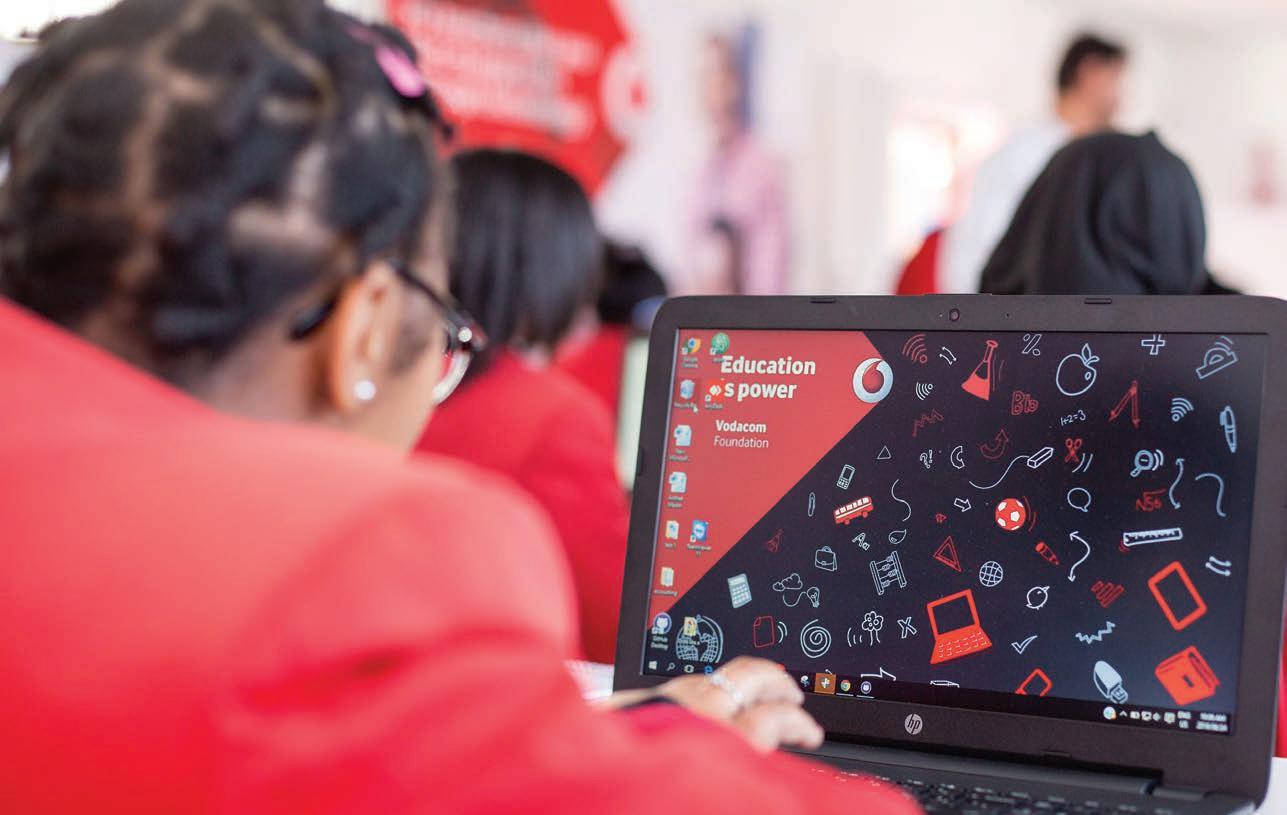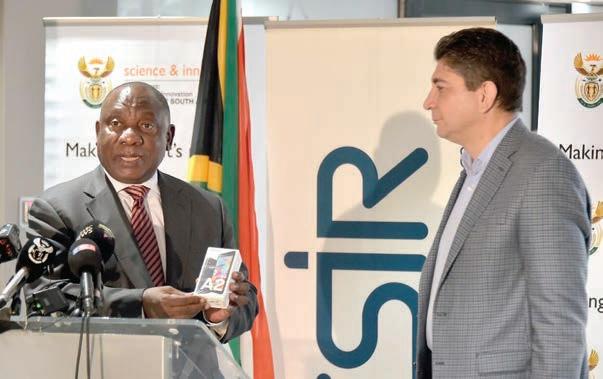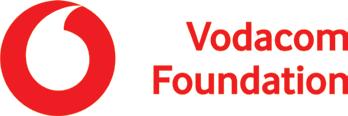
10 minute read
HUMANITARIAN RELIEF
A HELPING HAND FOR HUMANITY
The humanitarian work of Gift of the Givers relies hugely on funding from corporates and individuals, writes TREVOR CRIGHTON
Founded by Dr Imtiaz Sooliman in 1992, Gift of the Givers has provided food, shelter and aid to millions of people in Africa and beyond. It has also established hospitals, created agricultural schemes, dug wells, built houses, manufactured energy food, renovated fishing boats and runs clinics and provides scholarships.
Corporate relations manager Badrealam Kazi says that the organisation is driven to doing what needs to be done to help people in the face of disaster and challenges. “In the case of COVID-19, it was clear that a broad front in terms of disaster management had to be launched, encompassing medical and humanitarian relief,” he says.
He says that COVID-19 has made the organisation think even further out of the box than usual. “It has been a wakeup call for corporates and governments. Our major challenge is not so much on the health side, but on the humanitarian side. South Africa was already suffering the effects of the worst drought in modern history, a crippled farming sector and high levels of unemployment before
“Our major challenge is not so much on the health side, but on the humanitarian side.” – Badrealam Kazi, corporate relations manager, Gift of the Givers
the virus arrived. The government restrictions just pushed those already on the precipice over it.” Kazi says that the trickle-down effects of lockdown have affected everyone – especially in a country where one breadwinner supports an exponential network of family and friends – and have yet to be measured. “As government and the Department of Social Development try to set up structures to get more people into the social welfare net, many are still depending on NGOs for aid – and that’s where we and our fellow organisations come in.”
ALL SUPPORT WELCOMED
Gift of the Givers relies on funding to help keep its work going. Kazi says a donation by Engen of R2-million worth of fuel annually over the
GET INVOLVED
There are myriad ways to support the Gift of the Givers’ work. Many people run crowdfunding campaigns for speci c causes operated by Gift of the Givers, but it’s also possible to make general donations via direct bank transfer, online, MasterPass, MTN MOMO SA, MySchool and Shoprite. Visit giftofthegivers.org/make-a-difference/ or call 0800 786 911 (toll-free) for more details.
Food parcels are delivered to residents of communities in need.

next three years has significantly boosted the organisation’s logistical capacity and allowed it to access areas previously excluded due to prohibitive costs.
Speaking at the handover in February 2020, Engen chairman Dato Sri Syed Zainal Abidin said: “Engen is firmly committed to investing in sustainable development initiatives that offer tangible value to the communities in which we operate. Given the wide reach and incredible national relief efforts of the Gift of the Givers, Engen sees much value in this partnership.”
Kazi says that all support is useful, whether financial or in kind. “Many corporates give us food to distribute – Massmart and Shoprite give us good, high-value items to put into packs and Engen’s donation allows us to marry the various cash and kind donations to deliver a more efficient intervention,” he says.
However, Kazi stresses the need for developing a sustainable assistance system. “We don’t know how long COVID-19 is going to be here, but we do know that our partners and supporters don’t have bottomless pockets. We’re looking at ways to encourage and support communities in establishing potable water systems and growing fruit and vegetables,” says Kazi. “Many people on the ground are being proactive and trying to uplift their communities while help is coming from corporates and NGOs. Most NGOs are stretched extremely thin and doing all they can to simply keep their doors open in the hope of continuing to assist people.”
He says there is no question that government and NGOs need to combine resources to tackle COVID-19-related issues – and those that existed before. “We must work together – no single entity has the resources or capacity to reach every South African who needs help. Fortunately, we have an excellent relationship with government and our other partners in the NGO space, and we’ll continue to work together for the greater good.”
GIFT OF THE GIVERS PROVIDES
R3.2-billion in aid in 44 countries, over 28 years

Medical support for over 15 000 patientsa month

Over 150 wheelchairs annually

120 000 food parcels
in 7 countries annually


R50-million in bursaries

8 water trucks in 3 countries

Over 3 million litres of water monthly

2 operating desalination plants
More than 25 000 stationery packs each year


WORKING TOGETHER TO TURN THE COUNTRY AROUND

Vodacom has committed to assist the government in rebuilding the economy in the aftermath of the COVID-19 pandemic. By TAKALANI NETSHITENZHE, Vodacom Corporate Affairs chief offi cer
The coronavirus pandemic has disrupted life, transforming the socioeconomic landscape in South Africa and the world. Recent research from the World Bank shows that an additional 71 million people will be left in extreme poverty in 2020; effectively wiping out the progress made since 2017. Vodacom has designed a new six-point plan to help government rebuild the economy, turn-around the grim prospects and move the economy forward.
Now corporate South Africa needs to come together to support government as it works to rebuild the nation and the economy, whether it be in ensuring access to healthcare or supporting businesses and employees to get back on their feet.
Critically, to respond adequately to this challenge, Vodacom drafted a six-point plan, which is a summary of its Vision 2025 and is aligned to the eight Sustainable Development Goals that the company adopted in 2017/18 as its reporting framework. Digital technology is at the heart of this acceleration as the country rebuilds.
The six-point plan is in addition to Vodacom’s comprehensive COVID-19 response where, as part of the national collective effort, it made critical information and resources available to help government mitigate the impact of the virus. These include, most notably, Vodacom South Africa’s donation of 20 000 smartphones plus 100 terabytes of data and 10 million voice call minutes to the National Department of Health to help with its COVID-19 testing campaign, and Vodacom’s partnership with Discovery Health to provide free virtual health consultations to the general public to diagnose and treat the virus.
The six-point plan further identifi ed six main challenges preoccupying government: • expansion of the network infrastructure • education • enhancing digital accessibility and literacy for most vulnerable • SMME development • digital adoption • fi nancial inclusion.
HELPING BUSINESS OVERCOME LIMITATIONS
In March, the fi rst coronavirus case was announced in South Africa, forcing the country into a hard lockdown in a bid to limit infections. With this came the shift to remote work. Restrictions on work and movement have resulted in leaner budgets, with many businesses struggling to scale digitally in what is now an even weaker economy than at the beginning of the year.
This reality is the harshest for small, medium enterprises (SMEs) who are under immense pressure while having even more limited access to credit and funding. Securing credit would help to buoy SMEs through the recovery phase ahead, particularly for those unable to meet stringent banking requirements needed to access credit through the usual channels.
Small businesses are the lifeblood of our economy, providing the largest, most diverse form of employment and revenue generation across all sectors. This is why it is more important than ever before to support them and ensure that as many as possible recover or remain viable businesses.
Large and innovative companies can do just that. VodaLend is an example of the type of support that can make all the difference. This platform allows SMEs to apply online easily for funding and receive an answer within a few hours, as long as they meet key criteria.

Takalani Netshitenzhe
In South Africa, VodaLend has facilitated loans to over 100 SMEs.
Traffi c on the Vodacom network increased by 40 per cent as people worked from home and remained connected for longer. In a bid to help customers connect, Vodacom implemented price cuts of up to 40 per cent on its 30-day data bundles and launched a range of free essential services available through a zero-rated ConnectU platform on 1 April. To cater to this demand during the lockdown period, Vodacom invested over R500-million to add network capacity and increase network resilience.
DIGITAL ACCESSIBILITY AND INCLUSION
Vodacom zero-rated close to 900 sites in education and health, the majority of which are education-related accessible via ConnectU. ConnectU is a zero-rated platform that provides content aimed at social development and offers a variety of essential services free of charge. For example, learners and students enrolled in schools and universities can access relevant information on this platform with no data costs. Vodacom ConnectU forms part of a broader Vodacom Group programme to create a social contract with its stakeholders that will address pressing societal challenges. The platform went a long way in assisting customers in these tough economic times and ensuring digital inclusion for all.
With the need for social distancing, came the closing of schools and the country turned to online learning to ensure continued learning for students. While schools have begun to open again, many have decided to continue with virtual learning in some form or another.
The company’s fl agship project, e-School, grew phenomenally during COVID-19. Since the lockdown in March, the platform saw registered users grow from around 900 000 to 1.2 million, demonstrating that parents, caregivers, and siblings are encouraging learners to access educational content online.
Vodacom’s free e-School platform, launched in partnership with the Department of Basic Education in 2014, proved to be a lifeline that the company could not have predicted at the time. It certainly showcases the importance of collaboration for improving and ensuring continuity in our basic education system.
PROMOTING DIGITAL ADOPTION FOR BUSINESS
SMEs are the cornerstone of economic development and are a priority area for policymakers. However, a University of Western Cape study indicates that 70 per cent of SMEs fail within fi ve years; a situation aggravated by COVID-19. Vodacom’s preferential payment policy enables the organisation to pay SMEs within three days of invoice submission, thereby helping to ensure their sustainability.
Using big data analytics, Vodacom provided a mobility insights solution for tracking the movement of COVID-19 patients across all provinces. This solution was integrated with censor’s data for improved insights on the social impact of COVID-19. The tracking solution was lauded by Free State MEC of Health Montseng Tsiu for helping that province turn the corner after fears that the coronavirus spread in the Free State would skyrocket following an outbreak at a church service.
What the pandemic has taught us is that collaboration and partnerships are crucial to help address problems and challenges as effectively as possible. The saying goes, “No man is an island”, this is also true of companies. The public and private sector as well as NGOs and nonprofi ts must work in tandem and support each another to solve the country’s biggest problems. It is the only way we will be able to move past the challenges of today and build the future of tomorrow.

For more information:
(+27) 11 653 5000 www.vodacom.com







